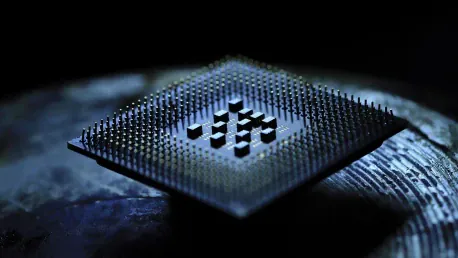The landscape of semiconductor manufacturing is undergoing a seismic shift, one that promises to redefine the fabric of technology production. At the heart of this transformation is Delta, in partnership with its U.S.-based subsidiary, Universal Instruments Corp. Unveiled at the SEMICON Taiwan 2024 event, their new AI-based automation and digital twin technologies are set to revolutionize the industry. These cutting-edge innovations promise to enhance efficiency, reliability, and cybersecurity, marking a new chapter in chip manufacturing.
Integrating AI and Digital Twin Technologies
Delta and Universal Instruments have set a decisive course for the future with the introduction of advanced AI and digital twin solutions. The DIATwin Virtual Machine Development Platform is at the core of this transformation, merging Delta’s industrial automation expertise with state-of-the-art virtual prototyping. This integration bridges the gap between digital design and physical production, allowing manufacturers to achieve unprecedented agility and speed. By adopting these new technologies, product development time can be reduced by up to 20%, a significant advantage in the fast-paced semiconductor industry.
The digital twin technology creates a virtual replica of physical assets, facilitating real-time monitoring, diagnostics, and optimizations. By simulating different scenarios and stress-testing designs virtually, manufacturers can preemptively identify potential issues, ensuring smoother production runs. This fusion of virtual and physical realms not only enhances operational efficiency but also minimizes risks, fostering an environment ripe for innovation. The ability to make adjustments in a virtual setting before implementing them in the physical world represents a significant leap forward in the manufacturing process.
Front-End Processing Innovations
Delta’s innovations extend into front-end processing with their Wafer Edge Profile Measurement Solution. This advanced solution employs Automated Optical Inspection (AOI) technology to meticulously scrutinize wafer edges. Traditional methods often run the risk of damaging wafers during inspections, but Delta’s AOI technology is non-destructive, ensuring high precision without compromising wafer integrity. This marks a considerable improvement over older methods that might sacrifice quality for the sake of inspection.
Capable of processing 60-120 wafers per hour, Delta’s solution offers remarkable throughput, meeting the demands of contemporary semiconductor fabrication plants. The customizable modules expand its functionality, encompassing fine-tuned measurements such as roughness detection and OCR laser-marking ID inspection. These features provide a robust, versatile tool that sets new benchmarks for quality control and production efficiency in semiconductor manufacturing. By incorporating such versatile and high-precision inspection capabilities, Delta positions itself as a leader in improving yield rates and maintaining the highest quality standards in wafer production.
Back-End Processing Enhancements
In back-end processing, Universal Instruments has introduced groundbreaking advancements, particularly with their High-Speed, Multi-Die Advanced Packaging system. Based on the FuzionSC™ Platform, this system is designed for accelerated semiconductor assembly, operating three times faster than conventional industry standards. This speed is crucial as the demand for miniaturized and efficient electronic products continues to grow exponentially.
Advanced packaging methods integrate numerous dies and passive components into a single package, a critical factor given the increasing complexity of modern electronics. Universal Instruments’ solution exemplifies precision and robustness, ensuring flawless semiconductor packaging. These capabilities are essential as electronic devices continue to shrink in size while expanding in functionality. The precision and speed offered by the High-Speed, Multi-Die system not only enhance production rates but also improve the overall reliability and performance of the final electronic products.
Emphasizing Cybersecurity
In today’s interconnected world, cybersecurity has become a paramount concern, particularly in semiconductor manufacturing processes. Delta and Universal Instruments are taking proactive steps to safeguard these processes, aiming for SEMI E187 certification as a testament to their commitment to cybersecurity. This international standard prescribes critical practices for securing semiconductor equipment, ensuring resilience against potential threats.
Implementing stringent protocols such as Software Bill of Materials (SBOM) scanning, vulnerability tracking, and application whitelisting, Delta aims to safeguard the manufacturing infrastructure from cyber attacks. These measures are crucial as the semiconductor industry becomes increasingly connected, making it more susceptible to cyber threats. The dedication to rigorous cybersecurity standards reflects a broader industry trend toward ensuring that critical technologies and processes remain secure and resilient in the face of evolving threats. By prioritizing cybersecurity, Delta and Universal Instruments are not only protecting their own operations but also contributing to the overall security of the global semiconductor supply chain.
Pioneering the Future of Semiconductor Manufacturing
The landscape of semiconductor manufacturing is experiencing a monumental transformation, poised to redefine the essence of technology production. Central to this evolution is Delta and its American subsidiary, Universal Instruments Corp., which have unveiled groundbreaking AI-based automation and digital twin technologies at the SEMICON Taiwan 2024 event. These state-of-the-art advancements are engineered to significantly boost efficiency, reliability, and cybersecurity within the chip manufacturing industry.
Delta’s new technologies aim to streamline production processes, eliminating bottlenecks and reducing errors through sophisticated AI algorithms. The integration of digital twin technology enables real-time simulation and monitoring, providing manufacturers with unprecedented insights into their operations. The synergy of these innovations not only promises to enhance productivity but also ensures higher security standards by preemptively identifying potential vulnerabilities.
This paradigm shift is not merely an incremental improvement but a significant leap forward that redefines the semiconductor sector’s future. By incorporating these advanced technologies, Delta and Universal Instruments Corp. are setting new benchmarks, heralding a new era in chip manufacturing.









